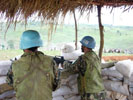
Lots of changes – some substantial, others cosmetic – are afoot for the world’s largest peacekeeping force, the nearly 21,000-strong U.N. mission in Congo, or MONUC. Bowing, in part, to the demands of Congolese President Joseph Kabila, the U.N. Security Council has voted to drawdown the force by 2,000 peacekeepers by the end of June, conditioning further withdraw of peacekeepers on the Congolese government’s ability to meet certain security requirements.
President Kabila initially said that he wanted to see MONUC withdraw from the country by Congo’s 50th anniversary of independence on June 30, and then revised the deadline, calling for foreign forces to be off Congolese soil in time for the presidential election in October 2011. Critics have been quick to note the convenience of having 19,000 U.N.-affiliated eyes out of the country in time for Kabila’s re-election bid and a vote that is widely expected to be contentious.
Speaking to reporters following the Security Council vote last Friday, U.N. peacekeeping chief Alain Le Roy explained the significance of the mission’s name change, from MONUC to MONUSCO, which stands for the Organization Stabilization Mission in the Democratic Republic of the Congo – stabilization being the operative word. "He wanted the international community to acknowledge they have entered a new phase," Le Roy said. "We acknowledge that the situation has improved," he said, but he added that the situation in eastern Congo remains perilous. “We are not able to protect every single citizen,” he said.
Indeed, while MONUC operates under a Chapter VII mandate, granting the peacekeepers the right to “take necessary action” against potential assailants to protect civilians, rights groups, including Enough, have documented numerous occasions in which armed groups have deliberately targeted civilians within close range of peacekeepers.
Congo expert/blogger Jason Stearns boiled down the changes in MONUSCO’s mandate into a bulleted list, and he included some insights about Security Council politics prior to passage of the reauthorization resolution: “China is trying to remove many of the concrete suggestions for how to protect civilians, as well as the conditionality of supporting the Congolese army. The Americans are pushing strongly for protection of civilians (but not security sector reform), while Austria is pushing on strong language on security sector reform. Uganda – wonder of wonders – didn’t see the need to say that sexual violence was ‘widespread.’”
Alarmingly, though not surprisingly given President Kabila’s recent appeals toward state sovereignty, the final resolution passed by the Security Council emphasized the role of the U.N. to “support,” act “upon explicit request from,” and “assist” the Congolese government on fronts ranging from training its army, to helping displaced people return home, and preventing armed groups from benefiting from the East’s lucrative mineral resources. Of course, the catch-22 of this plan is that the Congolese soldiers are themselves one of the major predators threatening civilians and exploiting mineral wealth in the region. One Congolese commander, Bosco Ntaganda, is wanted by the International Criminal Court for war crimes. In another serious indictment, the latest Group of Experts report, leaked to the press late last week, identified government agencies levying illegal taxes at various stages of the mineral trade. With this track record it’s difficult to be optimistic about the willingness of Congolese state and military authorities to initiate the meaningful reforms that need to occur.
Along with the mandate changes, which take effect on July 1, MONUSCO will also have new leadership, as head of mission Alan Doss recently announced his retirement. French diplomat Jean-Maurice Ripert’s name has been floated for the post. Ripert is currently serving as the New York-based U.N. special envoy to Pakistan.
Photo: MONUC peacekeepers in eastern Congo (IRIN)

